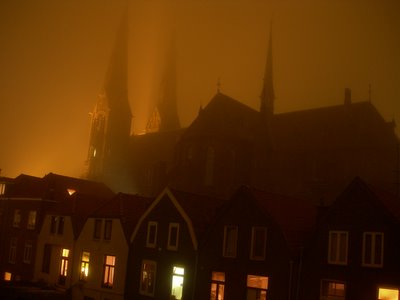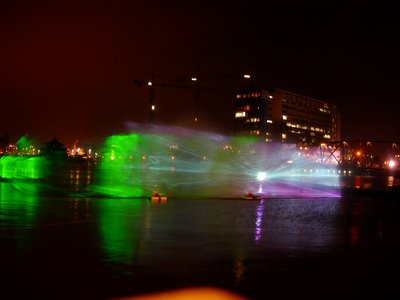Friday, December 23, 2005
All'Italia
Buon Natale e Felice Anno Nuovo!
Wednesday, December 21, 2005
Great music site
Africa
I find this doubly shocking because of a) my generally contrarian stance and b) the fact that I usually detest him even if he is Gordon's best-ever star-spot (actually verging on a star-fuck, I believe).
I want to be a speechalist
One thing he said (for real) that I can never agree with: "I know the human being and fish can coexist peacefully." Unbelievable - it's like Munich 1938 all over again.
End of term
Also took the opportunity to get back on the cooking wagon. One leaving friend sold her collection of books, so I bought one called Solo Dinners. Beyond the really unfortunate name - I think Dinners for One or Two would have been much better and would have got the message across just as well - it's quite a nice cookbook. Last night, I made a White bean guazzetto with seafood and greens, which, though it didn't come out like it looked in the book, tasted lovely - and was just as good today with some pasta thrown in or a type of pasta e fagioli.
Today, after putting in some solid work, I bought a new frying pan and went to one of the nice butchers they have in The Hague (I love butchers) to get some fine lamb chops. Delish with potatoes and broccoli. That kind of meal - meat, potato/rice and one veg - is for me true comfort food - it makes me feel like I've had a real dinner, the type I get at home. Sometimes when I make one of 8 Rutland Rd's signature dishes - diced potatoes or fried broccoli, cauliflower and onions - I get a very bittersweet homesickness. (My folks and Al are in Wilderness right now - it would be great to be with them - but I'll see 'em all in varying stages over the next few months.)
Book klub
Verdict: kind of worth reading. Better than The Corrections, not as good as Underworld, doesn't hold a candle to The Amazing Adventures of Kavalier & Clay. Can't really compare it to Infinite Jest, because I haven't quite managed to finish it (it is infinite, after all).
Nobel beef
Come on Nobel Committee - buck up!
I may have changed my mind about cricket
(Still not quite sure about football, though.)
Monday, December 19, 2005
Bliary time
Monday: Nope, too long ago. Watched quizzes at night. May have played squash.
Tuesday: I'm convinced something happened. Oh yes - I had my first proper meetings with my judge, ex-president Meron. In the first one I put my phone numbers in his cell. In the second, he asked me for an oral briefing on the two decisions I'd written. Went well - he said it was a very good briefing. (Actually, I think that happened on Monday). May have played squash.
Wednesday: Went bowling for Eric's farewell. Started out none-too-impressively, finishing bottom of my group with a 75, but ended off with a 109, topping not only my group but also everybody. Gave me a fair amount of pleasure, which is silly really as I've never exactly sold myself as much of a bowler.Still, it's nicer to have the pins fall down than not, and it's the nature of the game that one pin that doesn't fall is inordinately frustrating because it makes such a difference to the score. Afterwards, to Wicked Wines for a drinkypoo.
Thursday: I definitely played squash, taking 5 games off an opponent who had beaten me 4-1 the previous week. I find I've actually improved a fair amount just in the couple of weeks I've been playing again. Still a long way from where I was, but I'm enjoying it. Unfortunately, both of my squash partners are leaving so I'll have to advertise for new ones. Afterwards, Harris's farewell at Savannah, at which I surprised some Irish friends with my knowledge of Foster & Allen (the next night I surprised a guy from Michigan with my knowledge of Saginaw - it doesn't take very much, I guess). Then we went to another bar where I got hit with a massive wave of stupidity and started drinking tequila, which made
Friday: Horrible. Yuk. Ecch. I want to forget the whole day, at least before about 6 o'clock. Not only did I arrive late, but I found an e-mail asking me to write an urgen decision. They wanted me to think!! How dare they! I wasfeeling very slow. But I wrote it and it was fine and it all worked out alright. That night we had a party at our house which I initially felt like like a hole in the head, but it ended up being a lot of fun. Went out to De Koninghoek for more farewells, which was enjoyable, then home.
Saturday: Woke up, watched football (a better victory), moped around town trying w/o success to get my lock busted and tickets for the evening. Pre-concert, cocktails and canapes at Laurel, with some excellent cheese. Then to Paard van Troje to see Canadian sensation Broken Social Scene. Actually, our crowd from the ICTY were the only ones to really see them as a sensation - we constituted a fair proportion of the crowd and were the only ones dancing. Indeed, we got a shout out to that effect. The band, a 10-piece, were possibly the ugliest I've seen since Iron Maiden, with all possible varieties of mustache, but their music, especially the more upbeat stuff, was very good. When they finished, we saw the sheer panoply of weirdness that the Dutch regularly receive (which probably explains something). Room 1: an old Dutch man declaiming what may have been poetry or something about modern Russian history, with a fey guitarist and an even feyer keyboardist noodling away in the background. Room 2: The Hank and Lily Show, which was of course transvestite cabaret, with a guy dressed as a cowboy in a scary futuristic metal mask wandering on and off stage and another man with a walrus mustache watching from the wings. Room 3: Millionaire, who are the single worst band I have ever heard. Heavy metal circa 1988-vintage: extremely loud, incredibly unpleasant. The only point of this music that I can figure is that it's made for people who hate the worldand want confirmation that all that is in it is hateful.* So we wnt to the champagne party held by the hitherto unknown Reuben and Micah. Oodles of fizzy wine, which made one feel quite bubbly.
Sunday: Lunch with Mike, then I bought a Sunday Times, read it, squash with Eric, pasta at home, bed.
Fascinating, eh? (These Canadians are becoming infectious.)
* Do you think it's unusual to have a sentence with four 2-letter words in a row? I do. Or do I?
As I predicted
Thursday, December 15, 2005
Headline of the year
Wednesday, December 14, 2005
Blast from (one of) my (many) past(s)
First, it's very clear about the things literary theorists do, so one can read it if even if one isn't currently immersed in the field.
Second, it presents an interesting contrast between hermenutics (the idea that the main task of criticism is interpretation, which is inevitably political - the author of the article writes thus: "Interpretation is the revenge of moralism upon art, and that is what makes it so politically dangerous") and aesthetics (studying how we respond to art, emotionally, physically etc - famous quote from Susan Sontag: "In place of a hermeneutics we need an erotics of art").
The author comes down strongly on the side of aesthetics, and I think I largely do as well, though more so in forms other than literature. That is to say, when presented with paintings or sculpture or movies, and so forth, I frequently find the question "What does it mean?" unhelpful and pointless, preferring (when I'm feeling deep) to look at the effect the artwork has on us and how the artist has achieved that effect. The wonderful thing about music (at least, that music with either no lyrics or meaningless lyrics, eg, "Fatboy Slim is fucking in heaven") is that the former question hardly ever arises, crackpot theories aside. With literature, one is sometimes forced to ask what it means, but I still think that is a less improtant question. With much poetry, for example, you have to actively figure out what the poet is saying before you can appreciate its effect - but the effect is the more important.
The third reason is that it reviews very favourably a new book and the way of thinking by an old professor of mine, Hans-Ulrich Gumbrecht (known as "Sepp"). I took a couple literary theory classes with him and they were wonderful. I saw him recently, when I returned to Stanford for my reunion, and he gave a talk on sports (you can see why we get on). So I feel a little connection.
The fourth reason is that it takes me back to the days when I was immersed in literary theory, and actually understood most of it. I found it fascinating and even at times important. However, it was a very specialised knowledge, and once you stop using it, it tends to go. A little while back, I was reading some papers I wrote in college. Some I was quite proud of, some a little ashamed of. But two of my bigger literary theory papers - both of which received A's - I didn't understand. Guess I'm just not as smart as I used to be.
Finally, one piece of literary theory (kind of) that I have always understood and always considered brilliant is Orwell's Politics and the English Language. All who care about language should read it. Anybody who does any sort of editing, paid or unpaid, for themselves or others, should read it right now.
Work-life balance
The other difference I think reveals something about my intellectual interests. In a nutshell, I find myself more interested in the law than the facts. Of course, the subject of these trials is very interesting, but I haven’t really found myself, unlike some of my colleagues, wanting to get immersed in it. When the judges accept an indictment or deliver a judgment, it’s quite big news in the Tribunal, and most people watch the live video feed. Me, I’ll listen out of one ear, but don’t find it all that fascinating. On the other hand, I’m more than happy to have long discussions over whether you can make an order by omission, or if a standard of likely risk (as opposed to substantially likely risk) can give rise to criminal liability, or what the principles of delegation should be. It’s the old fact/theory vs. people dichotomy, and I tend to be more into the former than the latter. I certainly have misanthropic and antisocial tendencies and often feel more comfortable with non-human things, which explains I think many of my successes and failings in life.
What I find interesting, in this little fit of self-analysis, is that novels have always been my favourite reading, and they tend to be mainly about people. Maybe, however, my choice of novels says something different than that. Any pop litero-psychologist who thinks they could diagnose something from my recommended-book list is more than welcome to give it a try.
Amazing video
New new look
Tuesday, December 13, 2005
Bike woes redux
New word learnt
Top 10 works of fiction
This is my fiction list, and I think everyone should read all the books on this. (I cheat a little by naming more than one book for some authors.) Each one of them moved me and aroused my sense of wonder. I also couldn't stop reading them once I started, as opposes to Moby Dick, which took me 18 months (though to be fair, it took me 2 years to finish Life, the Universe and Everything, but that's because I lost it 3 times). The links are either to Amazon, Wikipedia or something more interesting:
1. Hitchhiker’s Guide to the Galaxy trilogy (the first 3 books) – Douglas Adams (also cool)
2. Lord of the Rings – J.R.R. Tolkein (also cool)
3. Tender is the Night – F. Scott Fitzgerald
4. Midnight’s Children – Salman Rushdie
5. The Tin Drum – Gunter Grass
6. One Hundred Years of Solitude – Gabriel Garcia Marquez (check out Kennedy's review)
7. The End of the Affair/The Power and the Glory/virtually everything else – Graham Greene
8. The Music of Chance/New York Trilogy/virtually everything else – Paul Auster
9. American Tabloid/LA Confidential/virtually everything else – James Ellroy
10. The Amazing Adventures of Kavalier & Clay – Michael Chabon
More lists will follow. Now get reading!
Monday, December 12, 2005
Art shots (for Hotty)
Random views of The Hague
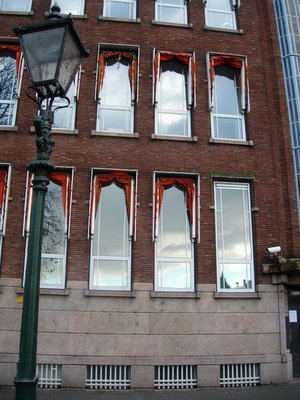
Parliament and the shark pond

Centre of town

Lovely view from the Tribunal I

Lovely view from the Tribunal II

A Real Gem

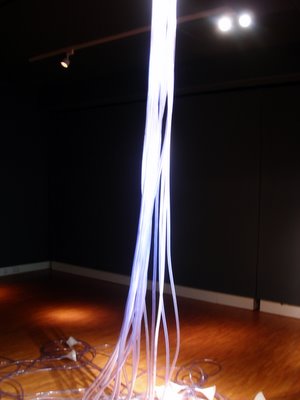
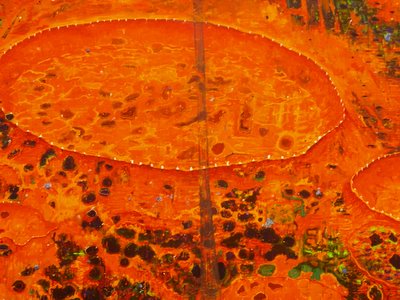

Those crazy European football fans
Quiz geeks rule
Beautiful Delft
This is the town hall.

This is the new church.

This is Hugo Grotius, one of Delfts' best-loved sons, and the father of my current discipline.

This is Hugo and the new church.

A great man dies
More kultscha
Morgan edietd News of the World (at age 28!) and The Mirror. He was fired for printing fake pictures of British soldiers abusing Iraqi prisoners, though it seems he has since been vindicated. I always thought him a detestable man, and I guess I still do, but he actually comes across quite well in the book. There's lots of fascinating stuff about the press and its relations both with people in power and the world of celebrity. Many great stories, though I think my favourite was where he sent one of his reporters (actually Rebekah Wade, who later became editor of The Sun), dressed up as a janitor, into the presses of the Sunday Times to steal their first edition as it came off the presses and print their big story as one of his own. What makes this even funnier, if you don't know, is that they're part of the same company - Murdoch's News International. You have to love the brass.
Also, fans of the Thugs will love the book as Morgan is a dedicated and biased Gunner (who touchingly has let that bias affect his news sense on the paper); there is an argument to be made that he sent the League from United to Arsenal in 2002.
Anyway, even for those who know and care nothing about England, a fascinating, totally compulsive book.
In movies, just saw Broken Flowers, Jim Jarmusch's most recent movie. I've always liked Jarmusch, though I tend to think his earlier movies, particularly Down by Law and Mystery Train, were his best. This one is very good - quiet, subtle, so simply and plainly done, with some wonderful work by Bill Murray and Jeffrey Wright. It's really about the weirdness of human connections, and defs worth seeing.
I hate football
Weekend report with Chevy Chase
The next day, for all the housemates and others further afield, was a saga of efforts to leave the house. Ana managed at 2:30, I managed at 3:30, Caroline got out at 5, Eric at 6, Harris at 8, Brad at 10 and Kristy not at all. Going outside was, admittedly, a bit of a shock, especially the discovery that the world outside, in stark contrast to the world inside my head, was not a barren wasteland, with piles of wreckage and acrid smoke the only evidence that there had once been life.*
The excursions themselves weren't very successful, as I failed to get a bike key and watched an unimaginably boring game between the Geordie Crybabies and the Thugs. Did however manage a game of scrabble which featured the rare words Deedilioh and Deedilioho.
Sunday was better and worse, as I had some fine Dim Sum, and saw a good movie (see above), but watched more awful football (ditto).
And that was the weekend. I'm Neil Johnson and you're not.
* Fascinating fact: the Chernobyl meltdown has actually been good for wildlife. Because no people have been allowed to live in the region (and because most of the animals died instantly, so there was very little radiation-induced mutation), the area has apparently become something like what Europe was before vast human settlement, with wild horses and other things running around. This is not to ignore the vast toll in animal deaths around the meltdown, and in human life and disease since then, but it is a bit weird.
My cousin the director
I feel it's OK to reveal the title of the movie and the fact that Cath has lined up, amazingly, Keisha Castle-Hughes of Whale Rider and Star Wars, and Radha Mitchell of Finding Neverland and Melinda and Melinda because Cathy and her movie are on IMDB! I am so excited, I could just platz!
Cath has been working on this movie for some time - I've seen her promotional material, and know a bit about it, and I think it'll be amazing. I'll let you know more whenever the acclaimed writer-director sees fit to release more information to the hungry public.
Go Cath!
Wednesday, December 07, 2005
Dutch quirks (and some cricket)
- I went to the drycleaner to see about getting my shirts washed and ironed, as ironing generally ranks dead last on the list of things I want to do. One shirt cost €2.55, three cost €5.95. This was still a little steep, but surely, I thought, if you could get a deal for 3 shirts you'd be able to get a better deal for 12 shirts. No chance - my suggestion to that effect was met with a look of incomprehension approaching horror. I said, "Then I'm afraid you'll get no business from me." The response: a stony-faced "Fine."
- Yet the Dutch were in the past among the greatest merchants in the world and even today punch well above their weight commercially. According to the Forbes 2000 list of global companies, Holland has 2 of the world's 10 largest companies, 3 of the top 50, 78 of the top 102 and 33 of the top 2000, putting them 12th on the global list. (The only other countries in the Top 10 are the US (5), UK (3) and Japan (1) - numbers add up to 11 because of Shell.) They have #2 in oil, #3 in food and drink, #4 in banking and #10 in insurance.*
- My squash club, which is nice and smart otherwise, doesn't have soap in the showers or a water fountain anywhere (and the water in the tap in the change room turns warm pretty quickly). This, especially the soap, is, in my experience unprecedented. A friend suggests this is because they're cheap.
- And yet, when I'd forgotten my towel and my friend hadn't brought the extra one I asked for, a Dutch chap in the changeroom heard my dilemma and offered to let me borrow his unused towel. I was quite amazed - as I would have been to receive such an offeanywherere in the world.
*I've put together the list for SA, but I'm not sure how reliable it is as Forbes lists countries by primary listing apparently, so Old Mutual, Anglo and SAB are all supposedly English. That makes me a little piqued, I can tell you. I have included the big ones I can remember (including those mentioned. Anyway, South Africa's equivalents are: 0/100, 2/200, 8/500, 9/1000 and 19/2000. World leaders in mining and brewing but nothing else.
Note: The above stats come from my love of going through lists and compiling things. I've always been a keen amateur statistician, and used to make bunches of them when I was young, especially world records and championships held by Jewish sportsmen, and cricketing records held for any period of time by South Africans, eg Jackie McGlew held the record for the slowest century (545 minutes - that must have been hell to watch**) from 1957 until 1977. I still have all these lists at home, so if anybody is interested let me know and I can make copies when I go home in February.
** Actually, the whole match, vs Australia, sounds awful (non-cricket-fans can probably stop reading now). On Day 1, 155 runs were scored, on day 2, 158, on day 3, 168, on day 4, 183, and on day 5, 175. Some of you (those who care) may be asking where I get this info: from my absolute 100% totally favourite site on the Internet: cricinfo.com. If you like cricket, go there and look around: it will ruin your productivity and make you much happier. (Unless you're South African and you follow those plonkers in West Australia. To lose by an innings! Against a state side! That had lost the 4 previous games! On a ground that we should do well on! I won't say I'm worried, but this doesn't augur well.)
Tuesday, December 06, 2005
Rooms with views
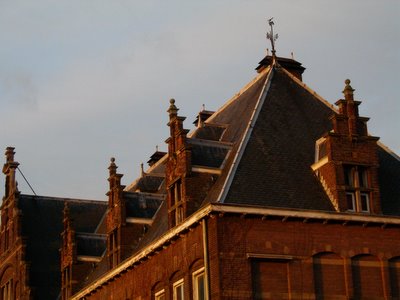

From my room in Casablanca:
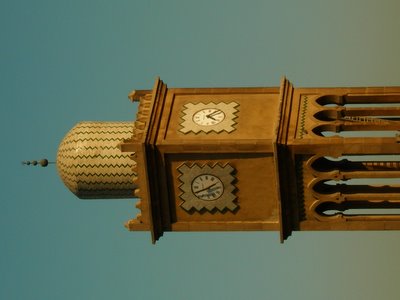
Similar, but from the toilet:

Ditto in Essaouira:

Kind of ditto:

A bit of Iceland in Holland



And here we are on the train back. Left-right: Tamara (office mate), Harris (New York Bar mate), me (everyone's mate), Caroline (housemate), Jeanne (office mate):

Lasers at dawn
First pictures - Iceland

A night at the opera
Maybe I should start playing chess again
Back in London again
Took the train in - more expensive, but about as quick and sooo much more relaxing, arriving at Waterloo shortly after 8 ready to rock. Hamish was in town, having beaten a hasty departure to London after receiving a death threat in Afghanistan. Told some interesting stories about Afghanistan, especially their friendliness and generosity. Reinforcing this, I read a letter to The Observer about an incident Dervla Murphy wrote about. When she was walking from Ireland to India (why? because it's there, I suppose), she stopped one day in Afghanistan for a little afternoon nap. When she woke up, she discovered that somebody had built a shelter over her head to protect her from the sun.
In one pub, we had a few pints of Santa's Little Helper, then a nice bar by Exmouth Market called The Easton, with a refreshingly honest bartender. I asked for a whisky sour, and he said they don't do cocktails. Why? "I can't be bothered, mate."
Next day was Family Day, going to see cousins Con and Susie and new baby Orla Marna out in the country. Rediscovered the joy of driving in London, but it was lovely once out there. Con and Susie used to live in a little village in Surrey called Shere, so we went there. Shere is highly pretty, and has a whole bunch of buildings that are 500 years old, all Tudor half-timber and tiny doors. Quite extraordinary, though needless to say if you lived there you'd probably consider it quite normal.
In the evening, we had a yen to go dancing (except, inexplicably, for my mother). Al and I started at Jazz Bar, which was really full and then thought we'd take a quick little trot down Kingsland Rd to Herbal. Well, it isn't quick at all! So, here's a piece of advice: don't try to walk from Jazz Bar to Herbal. But Herbal was cool, with good house music and pleasant-looking people. (As Hamish says, it's a rare dance club in that it welcomes heavy drinking.) Herbal was our choice for a night of "intermediate dancing", ie, ending at 3 rather than 6 or thereabouts. Worked perfectly.
And I got some slap chips with lost of salt and vinegar on the way home. A good time was had by one.
Bar talk
((I'm not going to gripe about the ridiculousness and stupidity of it all; it's all been done on A Girl Walks into a Bar (Exam)).
Monday, December 05, 2005
Two incredibly useful sites
The NYT article brings me to another brilliant site: bugmenot.com. For any site that requires registration, you can just go to bugmenot, enter the URL and voila, you have a username and password without having to go through all that registration rigmarole. There's nothing illegal or immoral about it: it won't give you free access to sites you have to pay for.
Smoke gets up your...
Local is lekker
At this point, I’m just discussing spelling and pronunciation qua spelling and pronunciation. There are some apparent spelling differences that are really different rules of grammar. For example, Dutch forms most plurals with “en”, Afrikaans with “e” and sometimes s (bicycles: fietsen v fietse). That is a different rule of grammar, not a rule of spelling or pronunciation. (In fact, an easy way to see the difference, though it may not be linguistically precise, is that in the above example both spelling and pronunciation change. Though I have also been told that the ‘n’ in Dutch ‘en’ is often silent, so maybe it is just a change of spelling. I’ll leave that to the professionals.)
I’m also ignoring the many changes in vocabulary, many of which can be traced to changes in pronunciation and spelling. For example: the word for “for” - Dutch “voor” (pronounced like for) vs. Afrikaans “vir” (pronounced fəɝ - there is no real equivalent to the sound in English) or the word for through – Dutch “door” (same pronunciation as English word) vs. Afrikaans deur (rhymes with beer). I might get to that later, but it’s more complex.
I am also not going into grammar, but the main difference is that Afrikaans is much simpler than Dutch, again possibly because of contact with English, which may have a wacky spelling but has a very simple grammar.
Spelling
Most of the spelling remains the same. The major changes, it seems to me, were to make Afrikaans look less strange to English readers. The “ij” and “uw” combinations, for example, never appear in English as far as I know. Also, Dutch uses lots of z’s, which are quite rare in English, so those were mainly replaced with s’s. (Afrikaans didn’t jettison all odd-looking (to English-reading eyes – the ‘uu’ combination is quite common.) Why Afrikaans famously doesn’t use the letter c cannot be explained by the same reason. Dutch doesn’t use it a lot either, but the consonantal combination “sch”, perfectly familiar to English, becomes “sk” in Afrikaans. There may be a reason of simplification – consonant compounds are quite complex and many languages don’t use them or use them sparingly.
For a breakdown, see Table 1 below. (If you can figure out how I can get the table back up here, I'd love to know - Blogger help is singularly unhelpful.)
| Dutch | Afrikaans | Tentative rationale |
| z | s | English |
| ij | y/ei/i | English |
| uw | u* | English |
| ch | k | Simplicity (?) |
| c | k | Simplicity(?) |
| sch | s | Allay confusion(?) |
| mt (end of word) | m | English |
| en (end of word) | nothing | ?? |
Pronunciation
When Afrikaans developed (1700s -1800s) Dutch obviously had a long written history. I don’t know when Dutch spelling was standardized, but I imagine it happened before Afrikaans became a commonly written language. (English spelling was only standardized in the 1700s with the great wave of dictionary making, especially by Samuel Johnson. Shakespeare famously spelled his name in up to 10 different ways.) As you see from the list above, very little Dutch vowel spelling was changed in Afrikaans, so the two languages look quite similar. But the pronunciation, especially of diphthongs, has diverged quite a lot.
To show the difference I have used, the English word with the same pronunciation, or tried to explain (badly) how it varies – I could use the symbol from the International Phonetic Alphabet, but that is unsatisfactory and I’m likely to make mistakes (my ear isn’t very good). This isn’t complete, and marks only significant differences. If I have made any mistakes please let me know. (If you’ve read this far, I’m sure you know something about Dutch, Afrikaans or linguistics.) (And ditto for this table.)
| Phoneme Spelling | Dutch | Afrikaans |
| ui | lout | similar to “late”, but pronounced with lips curved upwards, perhaps emphasizing the “e” of that sound (the long “a” in English is actually a diphthong consisting of bed + thick) |
| ei | ice | late |
| oo | loan or door | jewel |
| o..e | sofa | jeweller (Br/Saf) |
| ee | late | beer (Br/Saf) |
| ou | lout | loaf |
| eu | you/cute | similar to “fear” (Br/Saf pronunciation) but with the end of the diphthong being hit further back in the mouth to tend towards “food” |
Other interesting points:
- When and where the vowel shift occurred (let alone why) I don’t know. I’m also not enough of a linguist to see if it follows any consistent pattern, as in the Great English Vowel Shift (which always sounded like something out of Star Trek to me: “Strap yourselves in tight – we’re approaching the Great English Vowel Shift.”). I may look further into this later. Preliminarily, it affected mainly diphthongs or turned some simple vowels into diphthongs. I don’t know what that means.
- The first book printed in Afrikaans was supposedly the Koran, in 1835, in Arabic script. This reflects what many people now consider the real origin of Afrikaans – as an argot or Creole used by Malay slaves imported by the Dutch.
- It’s much easier for the Dutch to understand spoken Afrikaans than vice-versa (I have had this experience all over the place). Why this should be I don’t know; after all, vowel sounds different for Afrikaans speakers are equally different for Dutch speakers. It could be hypothesized that the Afrikaans sounds are more like what one would expect from the written letters, but as a follower of Saussure, I am bound to reject this.
- Some Dutch say that written or spoken Afrikaans is like baby Dutch or old fashioned Dutch. I think that’s a bad characterisation and rooted in contempt and a sense of superiority. Here’s why I think so:
- Written: The Dutch rationale is that Afrikaans grammar is simpler than Dutch grammar. I would posit that is actually the sign of a more “advanced” language (I use the term very advisedly). The history of English is partly one of grammatical simplification. Some languages in remote parts of the world which were never written down until the Europeans arrived (as in South America, Africa, the Pacific) have a much more complex grammar than Dutch. The San languages, for example, spoken by nomadic hunter-gatherers, are supposedly particularly complex, but I don’t think the Dutch would say San is more “adult” or “modern” than Dutch.
- Spoken: I don’t know what it is about the sound of Afrikaans that makes the Dutch think of it as baby Dutch. The consonant sounds are basically all the same; it’s the vowel sounds that change. Yet baby talk is characterised by different ways of pronouncing consonants: difficulties with r, l, s; less differentiation between consonants. Vowels are a much smaller indicator. The only (speculative) rationale I could imagine is fewer diphthongs and triphthongs, but Afrikaans has plenty – they’re just different.
- I never thought I’d defend Afrikaans. In school, my main aim with regards to the language was to fall asleep during class. I never managed though (sign of a true insomniac).
- Afrikaans, like Bulgarian, is extremely rare among languages in that it allows a stressed schwa.
* Afrikaans does on rare occasions use ‘uw’ as in nuwe=new.
Friday, December 02, 2005
Sam's the man
I also like this one: "What we hope ever to do with ease, we must learn first to do with diligence."
And this: "Whoever thinks of going to bed before twelve o'clock is a scoundrel."
He was a most precise and concise thinker. There are more here.
Thursday, December 01, 2005
Comics at length and briefly
But my question is, is the author of that article about Watchmen right? Did Watchmen kill comics? Or are there others out there that can wow, move and amaze me in the way these have? Let me know please.
You should laugh more
Ars longa Hague brevis
First stop was probably The Hague's most well-known museum: De Mauritshuis. This is known as one of the world's best small art museums, which is a fair characterisation. The exhibition was a fellow called Frans van Mieris, one of those pretty Dutch painters of the Golden Age - the 1600s - but the permanent collection has some special things in it. You walk into one room and there, nestled inconspicuously against a wall, is Girl with a Pearl Earring. And you can get right close to it (not like the Vermeer exhibition at the National in London a few years ago, where the crush prevented one from seeing anything properly). Then a room of Rembrandts; some great Holbein; a way cool Brueghel v. Rubens mash-up. And lots of paintings about sex, such as Spanking the Monkey, oops I mean Teasing the Pet:

The website is also superb, with descriptions of most pictures and reproductions of all of them. (My favourite small art museum is the Wallace Collection in London, which has a fine collection of Rembrandts. Actually, they have only 1 by RvR, but also 1 ascribed to him, 4 by his studio, 1 by his circle, 1 by an imitator, 2 after him, and 765 by people who weren't Rembrandt at all. It's also the place to go for The Laughing Cavalier, who isn't laughing and wasn't a cavalier. I guess the naming practice is quite cavalier.)
Then Panorama Mesdag, which has to be seen to be believed. This is the work of a baker (banker? it isn't clear)-turned-artist, who decided to do a massive indoor painting showing the panorama from a sand dune overlooking the beach at Scheveningen. Van Gogh said about it: "The Panorama Mesdag is the most beautiful sensation of my life. It has just one tiny flaw and that is its flawlessness." It is 14 metres high and 120 metres round. Thanks to a skylight, the light is ever changing. It is so realistic and yet so artificial that it gave me vertigo. It's actually worth coming to The Hague just to spend 10 minutes looking at it.
Then we moved on to some more modernity.
GEM, the museum of contemporary art (or whatever "actuele" means) is just OK - uninspiring paintings, strange "sound art". There is one upcoming exhibit which sounds interesting - The Ideal Muslim Woman- but the title could well be the most interesting part of it.
Next to it, though, is the Fotomuseum which, if you like photos, as I do, is very cool. Their exhibit is this Dutch photojournalist called Willem van de Poll, who's been around for donkey's years, and is now, as the site says, almost forgotten. Great shots of Dutch colonies, Israeli independence, the Philips factory (he got around). There's a really cool selection of his photos in the quite impressive National Archives site; or you could browse his entire oeuvre of 30,000 photos. Here's one I like:

Also, other cool contemporary photos. This one, of Pinochet and his cronies, is in another museum altogether:

Our final stop was the Gemeentemuseum, which is alternately wild and wacky and really staid. We skipped the 1,165 rooms dealing with gold and silver in The Hague, and the area on Dutch and french fashion in the 1700s, and spent about 4 minutes on their exhibit of Finnish Art around 1900 (why oh why didn't they do Finnish art around 1870? that was a true golden age). But they have the best collection of Mondrians in the world, and some freaky Francis Bacons. But the coolest things is downstairs: the Wonderkamers (wonder rooms). The room in the middle has a somewhat haphazard selection of stuff from their collection arrayed in nontraditional ways. V interesting. (The Brooklyn Museum has something similar, which they call Visible Storage - it's fascinating. I like it 'cause you can just look at the stuff without thinking to much - if you actually want to know what it is and who it's by, you have to go through quite a laborious process.) Then around that are these crazy rooms - weird tilings, form following function, guess the price of the artwork, run your own studio. You know - fun! (Unfortunately, the website is all in Dutch, so I'm still a bit in the dark, but we were all enthralled.) Also had a room designed by this top Dutch art director, who designed, among others, The Cook, the Thief, his Wife, and her Lover. Freaky movie and disturbing, but most rewarding. (Sample IMDB line: The dog excrement was actually chocolate mousse.) So, worth a - judicious - visit.
And I don't know about you, but I'm now exhausted. But now you know, there are many reasons to come to The Hague: it happens here™!
Bookpages (and others)
Iain M. Banks's latest, The Algebraist, is pretty good but not up there with Consider Phlebas or Look to Windward. It isn't set in The Culture, but in a new universe, which is extremely interesting. Most intriguing is a species that lives in gas giants, called the Dwellers - they live for millions, even billions of years, and apparently have got just about everywhere in the universe. There are some great far-out sci-fi ideas through the book, but there's less humanity than in his better sci-fi works. Still, all Banks fans will enjoy it; those who haven't discovered him yet should read one of those two mentioned above to start.
Banks's sci-fi books always include a good dollop of warfare. I wonder if he's read John Keegan's A History of Warfare. This is a truly impressive book, looking at all we know about warfare over the last 15,000 years in a mere 50 pages. He's a truly original thinker and spends much of the book refuting Clausewitz's maxim that war is the continuation of politics by other means (though some think he actually reinforced that thesis). Apart from very fluid, readable writing, what sets it apart is some quite innovative categorisation. the chapters are called War in Human History, Stone, Flesh, Iron, Fire. I think that says a lot. His description of the brutality of the Aztecs is quite stunning, but we all know about that. What I never realised before is the sheer savagery and courage of the Greek fighters (hoplites and others), about whom he makes a plausible case that they were the first modern warriors. If you're interested in history at all, read it. (Thanks to Brad for the recommendation.)
In a totally different vein is Marcel Pagnol's The Water of the Hills: Jean de Florette and Manon of the Springs. I'd seen the really wonderful pair of movies years ago, and I took this book from Neil's shelf. (Ta, bru.) A lovely read, evoking the nature of rural life, its beauty, pride and pettiness. It's got a nice straight narrative: betrayal, revenge and reconciliation. Very beautiful and deserves to be called a classic. Also, if you haven't seen the movies, you must. Straight away.
While I'm talking about great Claude Berri movies, I was intensely moved by Germinal, about a coal miners' strike (see cheesy trailer). And the other Claude, Lelouch directed a phenomenal Les Miserables 10 years ago. It is set both in the 19th century and World War II in France (revolving around a Jewish family), and is transfixing. (For the oldsters out there, it has the added advantage of starring Jean-Paul Belmondo.) Rarely have I seen a book transformed so elegantly and intelligently. Truly an epic - it has 100 speaking roles. And here's a quote from the, um, Jewish Bulletin of Northern California: "For Jewish audiences, the film frequently transcends entertainment to achieve robust poignancy." Robustly poignant? Fair enough.
More kultscha later.


